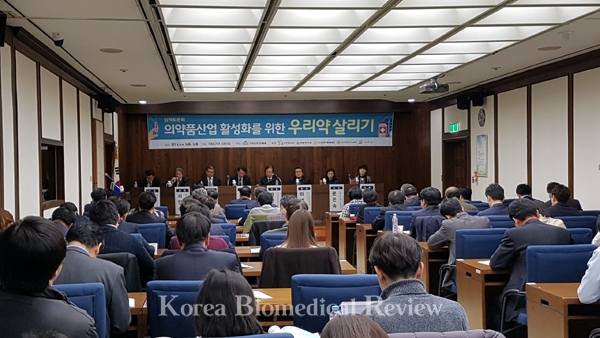Sense of crisis deepens amid growing market share of multinationals
The “let’s-save-our drug” campaign -- initiated by the domestic medicine distributors to fight against multinationals’ low-margin marketing policy -- is spreading to the pharmaceutical industry and hospitals.
At a policy debate hosted by Rep. Oh Je-se오제세 of the main opposition Democratic Party at the National Assembly Thursday, the representatives of domestic pharmaceuticals and hospitals called for using generic products made in Korea, with one voice. “We will contribute to the development of the industry and reduction of fiscal expenditure by reinvigorating the use of domestically-produced medicines,” they said.

The pharmaceuticals following the footsteps of drug distributors to join the “let’s-save-our drug” campaign, however, seems to reflect their deepening sense of crisis as the share of multinational drugmakers is gradually expanding in the domestic medicine market.
According to Health Insurance Review and Assessment Service건강보험심사평가원 (HIRA), the amounts of insurance claims for covered drugs made by both multinational and domestic drugmakers have increased over the past five years. However, the claims amount of multinational companies is growing more rapidly. Also, the claims made by top 10 domestic drugmakers have been on a decline, but those by higher-ranked multinationals have been on a steady rise.
The market size of insured medications stood at 15.3 trillion won ($13.4 billion) as of 2016, and the claims by Korean drugs amounted to 9.3 trillion won or 61 percent of the total. However, genetics accounted for 94 percent of their claims, reflecting their undue dependency on generics' sales.
Officials who participated in the debate said the government should come up with positive policy supports to invigorate the use of homemade medicines.
Noting that “our drug refers to domestically-made medicines, including generics and new drugs,” Jang Woo-soon장우순, head of Insurance Policy Office at Korea Pharmaceutical and Bio-Pharma Manufacturers Association한국바이오제약협회 (KPBMA), said the “let’s-save-our drug” campaign -- including generics, new drugs, incrementally modified drugs and raw materials medicines-- helps to enhance healthcare security, contribute to national finance, and attain the industry’s globalization at an early date through the virtuous cycle of research and development. “These show why we need state-level support,” he said.
Jang also proposed ways to promote the use of domestically made new drugs. According to him, pharmaceutical firms invested about 43 billion won on average into developing a successful new drug – such as Kanarb Tab, Noltec, and Zemiglo Tab -- but their accumulated for three years after release stood at an average of only 34 billion won. Not only were their payback periods too long but its speed is too slow in making a soft landing on the market, which adversely affects their overseas advances, too, he said.
“I propose the government to conduct market surveys on national and public hospitals for new drugs developed domestically with the government’s R&D support, to help them ensure clinical usefulness and significance,” Jang said. “The government can also contribute to revitalizing the use of homemade drugs by developing an incentive system for prescribing domestic drugs by including the prescription records of homemade medicines in the criteria of medical institutions.”
Seo Jin-soo서진수, deputy head of Insurance Division at Korean Hospital Association대한병원협회 (KHA), also agreed on the need for using Korean medicines.
“The drug evaluation committee composed of professors and pharmacists chooses drugs at hospitals. I hope the government develops an incentive to affect this process,” Seo said. “It 's hard, however, to introduce a direct stimulus. It is necessary therefore to provide incentives in purchasing and distributing homemade drugs. Also needed is the development of various new drugs at home. If the government implements the policy of reflecting these factors, it will affect hospitals, too. It is time to consider the matter comprehensively.”
Hwang Chi-yeop황치엽, chairman of Korea Pharmaceutical Distribution Association한국의약품유통협회, pointed out that the government has provided active support to the pharmaceutical industry with high added value, but the market turned its back on such efforts.
Chairman Hwang said the nation should move in the direction of saving health insurance and reducing patients’ burdens by using homemade generics.
He also noted multinational corporations have failed to contribute to creating jobs in Korea. “About 40 multinational companies are doing business in Korea. Only two of them – Otsuka and Janssen -- are operating their plants here, however. Other multinationals don’t have factories or have relocated them to Southeast Asia. Because they don’t have factories, they can’t create jobs, increase costs in case of import, and run out of stocks for protracted periods,” Hwang said. “I hope this will provide a turning point in the ‘let’s-save-our drug’ drive.”

